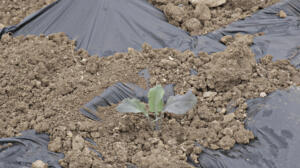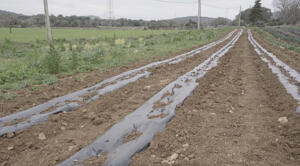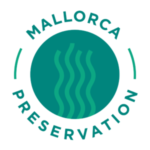
News
26 May 2023
PLASTIC-FREE AGRICULTURE
For the fifth consecutive year, organic farmers have chosen to break away from conventional plastic and adopt a biodegradable alternative to cover their crops. This environmentally friendly alternative, provided by APAEMA and supported financially by the Fundación Mallorca Preservation (MAPF), has successfully replaced conventional plastic and prevented an area equivalent to 50 football fields from being covered in non-biodegradable materials.
APAEMA, in collaboration with Mallorca Preservation, coordinates the joint procurement of biodegradable plastic for use in organic farming. This year, approximately twenty farms have joined the project, resulting in the use of around 170 kilometers of biofilm, weighing 3,000 kilograms. This significant quantity of biodegradable plastic has successfully replaced conventional polyethylene, which is commonly used in farming.
One of the key factors behind the success of this initiative is the financial support provided by MAPF, which assumes part of the additional cost associated with using biodegradable plastic instead of conventional plastic. This support has made it financially viable for farmers to choose the non-polluting alternative. Without this assistance, the adoption of biodegradable materials would have been less likely. MAPF’s continuous financial support over the years has helped consolidate the change and highlight the reduction in labor involved in using this biodegradable version.
Plastic mulch is widely used in professional vegetable production as an effective weed control technique. It offers several advantages, including reduced labor costs, easier work for farmers, and accelerated crop harvests. However, one of the main challenges associated with plastic mulch is its proper disposal once it becomes waste. Not everyone is willing to bear the cost and invest the time required to collect and transport it to designated collection points. Consequently, it is often burned in drums or shredded, resulting in countless small plastic fragments that can never be completely disposed of. Certain variants of conventional plastic, known as oxo-degradable plastics, which facilitate the reduction of microplastics, are already banned in some communities due to their detrimental environmental impact.
Biodegradable plastic, on the other hand, completely solves this problem. It decomposes and incorporates into the soil within a matter of months, leaving no residue behind. Unlike partial reductions achieved by other methods, biodegradable plastic made from organic materials completely disappears, providing a sustainable solution. Although the initial cost may be higher, the subsequent savings from eliminating the need for disposal outweigh the initial investment.
Over the course of this multi-year project, approximately twenty organic farms have benefitted from this initiative. As a result, more than 718 kilometers of non-biodegradable plastic have been avoided, replaced by 13,293 kilograms of biodegradable, non-GM biofilm. The positive impact of this project extends beyond individual farms, contributing to a cleaner and more sustainable agricultural sector on the island of Mallorca.
The success of this initiative serves as an example to farmers and agricultural communities worldwide, demonstrating that sustainable alternatives exist and can be economically viable with the right support. By adopting biodegradable plastic and reducing their reliance on conventional materials, organic farmers on Mallorca are taking significant steps toward protecting the environment and promoting a greener future for agriculture.



Una veintena de fincas sustituyen 170 kilómetros de plástico de acolchado convencional por otro biodegradableUna vintena de pagesos eco s’apunten al plàstic d’encoixinar biodegradableEls hortolans ecològics utilitzen 170 km de plàstic biodegradable
Esta web utiliza cookies para analítica digital, mejorar su experiencia de usuario y personalización de publicidad. Puede consultar nuestra política de cookies aquí.
